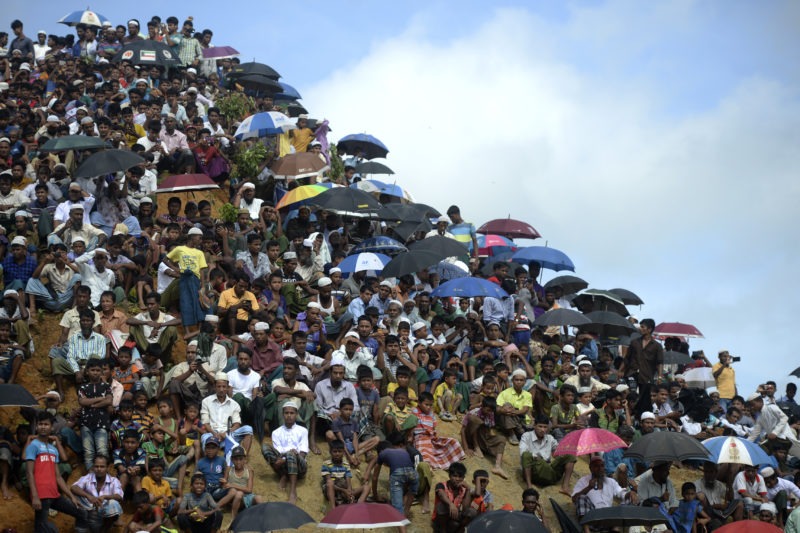UN experts urge probe of Rohingya killings in Bangladesh
At an August 25 rally, some 200,000 Rohingya refugees in Bangladesh marked two years since the exodus from Myanmar after a military crackdown (MUNIR UZ ZAMAN)
Dhaka (AFP) – UN human rights experts have raised new concerns about the treatment of Rohingya refugees in Bangladesh following a deadly backlash over the killing of a ruling party official.
The experts called for an “impartial” investigation into the deaths of at least six Rohingya men in gunfights with police after they were named as suspects in the killing of Omar Faruk, a youth wing official of the ruling Awami League.
Following the murder, local people vandalised refugee shops and staged protests in one of multiple camps now home to a total of more than 900,000 Muslim Rohingya who have fled oppression in neighbouring Myanmar.
In a statement released late Monday in Geneva, the six specially appointed UN experts on rights issues backed Bangladesh’s probe into the murder of Faruk.
But they added, “it is equally necessary to ensure that the presumption of innocence is upheld and that reactionary, summary and ad hoc justice is not doled out solely to placate the legitimate concerns of the host community.”
“We urge the Bangladeshi government to carry out an independent, impartial and effective investigation into all deaths that have occurred with regards to this case,” they said.
Police inspector Ali Arshad told AFP at least 40 Rohingya have been killed in Bangladesh since July last year. Of those, at least 33 were killed by Bangladeshi security forces in gunfights and another seven were killed in shootouts among Rohingya groups, he said.
Rights groups have accused Bangladesh police of staging many of these gunfights as a cover for the extrajudicial killings of Rohingya, mainly suspects in drug smuggling.
The UN experts also expressed “serious concerns” over “tight new restrictions” and a communication clampdown in the refugee camps, where there is an effective internet blackout.
The clampdown follows the failure of a new attempt to repatriate some of the refugees and an August 25 rally in which some 200,000 Rohingya marked two years since the exodus.
The UN experts said that since the rally, a number of organisers have been questioned and subjected to “intimidation”.
“We are alarmed by the sudden crackdown of the rights to freedom of expression, peaceful assembly and association,” they said.
“These restrictions have been applied in a discriminatory manner against members of the Rohingya minority,” said the experts who added that the “curfews and communications shutdowns could facilitate further serious human rights abuses against them.”
Disclaimer: Validity of the above story is for 7 Days from original date of publishing. Source: AFP.


